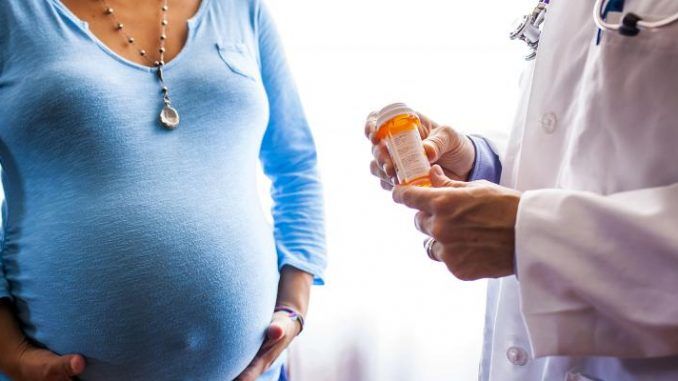
Researchers in Canada have discovered that antidepressants taken during pregnancy can increase the risk of autism by a staggering 87 percent.
The study published in JAMA Paediatrics looked at data from 145, 546 pregnancies, following the journey from conception up to the age of ten. The researchers found that mothers who took antidepressants during the 2nd and/or 3rd trimesters of pregnancy increased the risk of their child have autism.
Researchgate.net reports:

BYPASS THE CENSORS
Sign up to get unfiltered news delivered straight to your inbox.
You can unsubscribe any time. By subscribing you agree to our Terms of Use
We spoke with study senior author Professor Anick Bérard, Université de Montréal and the CHU Sainte-Justine Research Centre about the study. The full research team includes: Odile Sheehy, CHU Sainte-Justine, Laurent Mottron, Hôpital Rivière-des-Prairies, and Takoua Boukhris, Université de Montréal.
Anick Bérard: Using antidepressants, especially selective serotonin reuptake inhibitors (SSRI), during the 2nd/3rd trimesters of pregnancy increases the risk of having a child with autism (87 percent increased risk of autism with any antidepressants; more than doubling the risk with SSRI use specifically) – this risk is above and beyond the risk associated with maternal depression alone (maternal depression was associated with a 20 percent increased risk of autism in our study). Given the mounting evidence showing increased risk of adverse pregnancy outcome with antidepressant use during pregnancy, our study shows that depression should be treated with other options (other than antidepressants) during this critical period.
Indeed, 80-85 percent of depressed pregnant women are mildly to moderately depressed; exercise and psychotherapy have been shown to be efficacious to treat depression in this sub-group. Therefore, we acknowledge that depression is a serious condition but that antidepressants are not always the best solution.
RG: We normally think of the first trimester as being the riskiest time for the fetus, but this study was actually in the second and third trimesters. Why is the risk greater later in pregnancy?
AB: 1st trimester exposure is problematic for embryogenesis; 2nd/3rd trimesters are critical for brain development. Hence, the critical time-window for our study was the later part of the pregnancy.
RG: Do you think the rise in prescription antidepressants could be a cause of the rise in autism diagnoses?
AB: In part – yes given the association we have seen in our study. The rise in autism can also be explained by the increased detection and widening of the diagnostic criteria over the past decade.
RG: What do you want people to take from your study, and what don’t you want people to take from it?
AB: Take from it: Depression is a serious condition and needs to be treated. 80-85 percent of depressed pregnant women are mildly-moderately depressed. Antidepressants are only one treatment option in this population. Randomized controlled trials have also shown that exercise or psychotherapy are valid treatment options outside of pregnancy and for pregnant women as well.
Don’t take from it: That, given the increased risk of many adverse pregnancy outcomes (including autism) that have been reported in the literature, we are advocating non-treatment of depression. Depression needs to be treated during pregnancy but with something other than antidepressants in the majority of cases.
Our study is not out to scare women. It’s 2015 and women can make informed decisions, but they need to have evidence-based data. A discussion with their physician is warranted in order to fully consider all treatment options.
RG: What about women who are on antidepressants when they find out they are pregnant–are many advised to wean off as a normal patient would?
AB: Unfortunately, no at present. The common belief that depression can only be treated with antidepressants is false. I would always be very cautious about saying that anything is ‘safe’ during pregnancy. We have to remember that thalidomide was labeled as ‘safe’ for use during pregnancy.
RG: Is it safe to say that women on antidepressants in their second and third trimester are the ones who have already consulted a doctor and chosen to stay on their meds?
AB: I would hope that these women were able to fully assess the risk/benefit ratio. Unfortunately, I think that this overestimates the benefits and underestimates the risk under the assumption that antidepressants are the only treatment option – which is false.
RG: Did you also consider the severity of the mother’s depression or the dose of the drug used in your findings?
AB: We could not measure maternal depression severity. However, we found that mothers who took more than one class of antidepressants during the 2nd/3rd trimester were more than four times more likely to have a child with autism – this group could be seen as more severe than those using only one class during the same window. As for dosage, this is what we are doing at present (not included in our JAMA Pediatrics study). Our JAMA Pediatrics findings are for at least one dose of antidepressant (use vs. non-use) during late pregnancy. Now, we are looking at whether there is a dose-response effect (in a later study).
RG: What do you say to other recent reports that said taking antidepressants during pregnancy were safe?
AB: This study is consistent with other studies on the same research question. Each study is observational because randomized controlled trials are not ethically possible during pregnancy. Hence, each study is describing an association. The accumulation of such findings will lead to causation.
If a woman was optimally treated with antidepressants before pregnancy, she would have to increase her dosage in order to see the same benefit during pregnancy (due to increased metabolism during pregnancy). This is not what happens in practice: either she discontinues or she remains on the same dosage or even decreases her dosage – so there is no benefit in that case. The risks however remain unchanged. The risk/benefit ratio is clearly leaning towards no use. Treatment of depression with other options should be evaluated.


